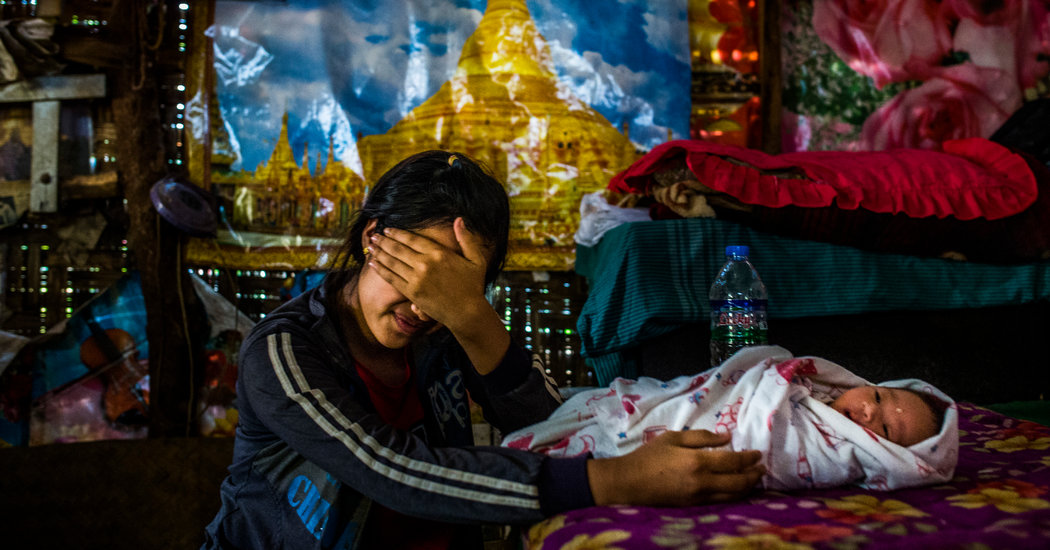Hong Kong News
Nonpartisan, Noncommercial, unconstrained.
Friday, Apr 26, 2024
Real, Diverse, Unbiased.

Teenage Brides Trafficked to China Reveal Ordeal: ‘Ma, I’ve Been Sold’
With women far outnumbered by men in China, some Chinese men are importing wives from neighboring countries, and using force to do so.
She did not know where she was. She did not speak the language. She was 16 years old.
The man said he was her husband — at least that’s what the translation app indicated — and he pressed himself against her. Nyo, a girl from a mountain village in the Shan hills of Myanmar, wasn’t quite sure how pregnancy worked. But it happened.
The baby, 9 days old and downy, looks undeniably Chinese. “Like her father,” Nyo said. “The same lips.”
“Chinese,” she added, like a curse.
China’s “one child” policy has been praised by its leaders for preventing the country’s population from exploding into a Malthusian nightmare. But over 30 years, China was robbed of millions of girls as families used gender-based abortions and other methods to ensure their only child was a boy.
These boys are now men, called bare branches because a shortage of wives could mean death to their family trees. At the height of the gender imbalance in 2004, 121 boys were born in China for every 100 girls, according to Chinese population figures.
To cope, Chinese men have begun importing wives from nearby countries, sometimes by force.
“Bride trafficking is very common here in Shan State,” said Zaw Min Tun, a member of the police anti-human-trafficking task force in Lashio, a town in northern Shan. “But only a few people are really aware of the trafficking.”
A study by the Johns Hopkins Bloomberg School of Public Health and the Kachin Women’s Association Thailand estimated that about 21,000 women and girls from northern Myanmar were forced into marriage in just one province in China from 2013 to 2017.
The hamlet in Mongyai Township, high in the Shan hills of northeastern Myanmar, is little more than an army garrison, with soldiers and their families sheltering in metal-roofed shacks on dirt lanes.
After finishing school last year, Nyo and her classmate, Phyu, who are being identified by their nicknames because they are minors, decided they wanted more than what this impoverished army outpost offered.
A neighbor, Daw San Kyi, promised them waitressing jobs on the border with China, through the connections of another villager, Daw Hnin Wai.
Ms. Hnin Wai had the nicest home in the village, much fancier than anyone else’s, so the waitressing offer carried weight.
“We trusted them,” Phyu, now 17, said.
Early one morning in July 2018, a van came to Mongyai to pick the girls up. The mountain road made Phyu carsick. Ms. San Kyi offered her four pills for her nausea, one pink and three white.
After that, Phyu’s recollection of events is fuzzy. Someone also injected her arm with something, she said. A photo taken of her during that time shows her face puffy and eyes dazed.
“Before this happened, Phyu was so happy and active,” said Daw Aye Oo, her mother. “But they gave her something to make her forget and trigger her sexuality. They beat her. She doesn’t know she is ruined.”
Nyo, also now 17, refused to take any pills. Her memory is clearer but no less confusing. There were stops at guesthouses along the border and a story about the heavy rain closing the restaurant where they were supposed to work. There was a boat ride and more cars.
After more than 10 days in transit, the idea of working in a restaurant receded from their futures, Nyo said. She and Phyu tried to run away twice, but they didn’t know where to go. The traffickers caught them and locked them in a room. Their phones had no signal.
Men who spoke Chinese came to see them. Some pointed at one girl, some at the other.
“I had a sense I was being sold, but I could not escape,” Phyu said.
One of the traffickers told Phyu she was lucky. He was allowing her to choose among the men. Phyu rejected a fat man and another who was old. She cried but the trafficker told her to stop because she needed to look pretty for her potential husband.
“I said I didn’t want to get married,” Phyu said. “I wanted to go home.”
A Human Rights Watch report released this year described the forces that have galvanized bride trafficking from Myanmar to China: “A porous border and lack of response by law enforcement agencies on both sides created an environment in which traffickers flourish.”
Neither girl remembers a border crossing, but suddenly they were in China. The girls were split up, each paired with a supposed husband, although no marriage paperwork was ever filled out, to their knowledge. After a long train ride, Phyu thought she had ended up in Beijing. The man who had bought her was Yuan Feng, 21.
The city had lots of bright lights and escalators. “The buildings were so tall that I couldn’t see the tops,” she said.
Mr. Yuan tried to communicate by using his phone as a translation device, but Phyu refused to speak. She was locked in a room with a television. In the evenings, he would come in and inject her arm and then force her to have sex, she said.
“I felt numb,” Phyu said. “He smelled sour. He smoked.”
Eventually, she pretended to be happy, Phyu said, and the injections stopped. They went out to a shopping center, but Mr. Yuan followed her everywhere, even to the bathroom. Another time, they went to an amusement park with Mr. Yuan’s sister and her young children. He rode the rides. Phyu did not.
Phyu learned some phrases in Mandarin. “‘Bu ku le’ means ‘don’t cry,’” she said.
She learned the passcode to her husband’s phone, and when he was drunk at night she called her mother through a social media app.
“I was glad to see her, but she didn’t look like herself,” Ms. Aye Oo, her mother, said. “She said, ‘Ma, I’ve been sold.’”
Nyo wasn’t sure where she had been taken in China, but she was determined to find out. At first, Gao Ji, her husband, also locked her in a room without any internet. He beat her, Nyo said.
But as the days passed, he began to trust her and allowed her to use social media, including WeChat, the Chinese social media platform.
Mr. Gao’s mother, who lived with them, fretted that Nyo was too thin to bear children. She made her foreign daughter-in-law fortifying rice porridge, thick wheat noodles and steamed buns.
“She would always say, ‘chi, chi,’” Nyo said, using the Mandarin word for “eat.”
With her phone, Nyo secretly filmed what she could to determine her whereabouts: a drive on the back of Mr. Gao’s scooter, the license plate of the family car, the entrance to their two-story house. She geotagged each video and photo.
The place was Xiangcheng County in Henan Province. Located on China’s central plains, Henan is one of the country’s most populous provinces, with about 100 million people, double Myanmar’s population.
In the 2005 national census, Henan reported one of the widest gender disparities in China, with 142 boys born for every 100 girls. (Some baby girls were not reported to the authorities, so the real disparity is likely to be lower, and China’s population control measures have now been relaxed.)
The area around Xiangcheng has a history of importing trafficked women. This year, three women from Myanmar and one from Vietnam were rescued there, Henan news media reported. In 2009, 10 others from Myanmar were found.
It turned out that Phyu was in Xiangcheng, too, not Beijing. To girls from an isolated village in Myanmar, Xiangcheng seemed impossibly big.
The house, too, was big, Nyo said, spacious enough that Mr. Gao’s parents couldn’t hear when she screamed as he forced himself on her.
“I think he was rich,” she said. “Because otherwise he couldn’t afford to buy a wife and have such a big house.”
In truth, it is poorer Chinese men who tend to buy trafficked women as wives. Still, even they must pay a lot. Nyo was sold for $26,000, said Myo Zaw Win, a police officer in Shan who tracked her case.
Through a Shan woman who has helped rescue girls sold into sexual slavery in China, Mr. Myo Zaw Win started corresponding with Nyo on Mr. Gao’s WeChat account, pretending to be her brother.
Then the policeman, who had been in communication with the Chinese authorities, made his move. Mr. Gao had become suspicious and asked who Mr. Myo Zaw Win really was. He responded with a single word in English: “Police.”
Two months after the girls arrived in Xiangcheng, the Chinese police knocked on their husbands’ doors.
Mr. Yuan and Mr. Gao, the girls’ husbands, were detained for at least 30 days, as mandated by the law, said Niu Tianhui, a spokesman for the Xiangcheng police bureau. He said he did not know whether they spent further time in detention.
“The families of the husbands are mad about the case because they spent a lot of money but lost their wives,” Mr. Niu said.
A Chinese man, Zhao Moumou, was arrested on accusations of forcing the two girls into sexual servitude.
It would be weeks before the two girls returned to Mongyai. First, they were sent to a Chinese police station, where they were charged with illegal immigration. Then they journeyed south by train to a shelter for trafficked girls in northern Shan.
“When I saw Burmese letters on the signs, I was so happy,” Phyu said of the moment they stepped back in Myanmar.
The girls’ home in Shan State, in the foothills of the Himalayas, has been torn by ethnic warfare for decades. With the Myanmar Army battling various ethnic militias and committing what the United Nations says are war crimes, peace and security are unknown commodities. Women and children are the most vulnerable to abuse.
“Bride trafficking is the consequence of civil war,” said Lauh Khaw Swang, a project manager for the Htoi Gender and Development Foundation in Kachin State, which neighbors Shan and is also embroiled in armed conflict.
Ms. San Kyi, the neighbor who the girls say kidnapped them, is now in jail in Lashio. Ms. Hnin Wai, the other woman believed to be a local trafficker, is on the run.
Ms. Hnin Wai’s husband, U Naung Naung, still lives in the spacious pink house with a portico that his wife’s trafficking commissions appear to have earned them. He says he has no idea where she is.
“I didn’t know she was doing anything wrong,” Mr. Naung Naung, an army sergeant, said. “I thought she made her money working as a fortuneteller.”
Mr. Naung Naung said he had apologized repeatedly to the families of the two girls. But Phyu’s mother, who lives just down the street from him, said he had never approached her.
As her pregnancy progressed, Nyo decided she would give up the child for adoption. Then her baby was born.
“I wanted to give her away but I looked at her and I loved her,” Nyo said. “Even with that Chinese animal’s lips.”
The man said he was her husband — at least that’s what the translation app indicated — and he pressed himself against her. Nyo, a girl from a mountain village in the Shan hills of Myanmar, wasn’t quite sure how pregnancy worked. But it happened.
The baby, 9 days old and downy, looks undeniably Chinese. “Like her father,” Nyo said. “The same lips.”
“Chinese,” she added, like a curse.
China’s “one child” policy has been praised by its leaders for preventing the country’s population from exploding into a Malthusian nightmare. But over 30 years, China was robbed of millions of girls as families used gender-based abortions and other methods to ensure their only child was a boy.
These boys are now men, called bare branches because a shortage of wives could mean death to their family trees. At the height of the gender imbalance in 2004, 121 boys were born in China for every 100 girls, according to Chinese population figures.
To cope, Chinese men have begun importing wives from nearby countries, sometimes by force.
“Bride trafficking is very common here in Shan State,” said Zaw Min Tun, a member of the police anti-human-trafficking task force in Lashio, a town in northern Shan. “But only a few people are really aware of the trafficking.”
A study by the Johns Hopkins Bloomberg School of Public Health and the Kachin Women’s Association Thailand estimated that about 21,000 women and girls from northern Myanmar were forced into marriage in just one province in China from 2013 to 2017.
The hamlet in Mongyai Township, high in the Shan hills of northeastern Myanmar, is little more than an army garrison, with soldiers and their families sheltering in metal-roofed shacks on dirt lanes.
After finishing school last year, Nyo and her classmate, Phyu, who are being identified by their nicknames because they are minors, decided they wanted more than what this impoverished army outpost offered.
A neighbor, Daw San Kyi, promised them waitressing jobs on the border with China, through the connections of another villager, Daw Hnin Wai.
Ms. Hnin Wai had the nicest home in the village, much fancier than anyone else’s, so the waitressing offer carried weight.
“We trusted them,” Phyu, now 17, said.
Early one morning in July 2018, a van came to Mongyai to pick the girls up. The mountain road made Phyu carsick. Ms. San Kyi offered her four pills for her nausea, one pink and three white.
After that, Phyu’s recollection of events is fuzzy. Someone also injected her arm with something, she said. A photo taken of her during that time shows her face puffy and eyes dazed.
“Before this happened, Phyu was so happy and active,” said Daw Aye Oo, her mother. “But they gave her something to make her forget and trigger her sexuality. They beat her. She doesn’t know she is ruined.”
Nyo, also now 17, refused to take any pills. Her memory is clearer but no less confusing. There were stops at guesthouses along the border and a story about the heavy rain closing the restaurant where they were supposed to work. There was a boat ride and more cars.
After more than 10 days in transit, the idea of working in a restaurant receded from their futures, Nyo said. She and Phyu tried to run away twice, but they didn’t know where to go. The traffickers caught them and locked them in a room. Their phones had no signal.
Men who spoke Chinese came to see them. Some pointed at one girl, some at the other.
“I had a sense I was being sold, but I could not escape,” Phyu said.
One of the traffickers told Phyu she was lucky. He was allowing her to choose among the men. Phyu rejected a fat man and another who was old. She cried but the trafficker told her to stop because she needed to look pretty for her potential husband.
“I said I didn’t want to get married,” Phyu said. “I wanted to go home.”
A Human Rights Watch report released this year described the forces that have galvanized bride trafficking from Myanmar to China: “A porous border and lack of response by law enforcement agencies on both sides created an environment in which traffickers flourish.”
Neither girl remembers a border crossing, but suddenly they were in China. The girls were split up, each paired with a supposed husband, although no marriage paperwork was ever filled out, to their knowledge. After a long train ride, Phyu thought she had ended up in Beijing. The man who had bought her was Yuan Feng, 21.
The city had lots of bright lights and escalators. “The buildings were so tall that I couldn’t see the tops,” she said.
Mr. Yuan tried to communicate by using his phone as a translation device, but Phyu refused to speak. She was locked in a room with a television. In the evenings, he would come in and inject her arm and then force her to have sex, she said.
“I felt numb,” Phyu said. “He smelled sour. He smoked.”
Eventually, she pretended to be happy, Phyu said, and the injections stopped. They went out to a shopping center, but Mr. Yuan followed her everywhere, even to the bathroom. Another time, they went to an amusement park with Mr. Yuan’s sister and her young children. He rode the rides. Phyu did not.
Phyu learned some phrases in Mandarin. “‘Bu ku le’ means ‘don’t cry,’” she said.
She learned the passcode to her husband’s phone, and when he was drunk at night she called her mother through a social media app.
“I was glad to see her, but she didn’t look like herself,” Ms. Aye Oo, her mother, said. “She said, ‘Ma, I’ve been sold.’”
Nyo wasn’t sure where she had been taken in China, but she was determined to find out. At first, Gao Ji, her husband, also locked her in a room without any internet. He beat her, Nyo said.
But as the days passed, he began to trust her and allowed her to use social media, including WeChat, the Chinese social media platform.
Mr. Gao’s mother, who lived with them, fretted that Nyo was too thin to bear children. She made her foreign daughter-in-law fortifying rice porridge, thick wheat noodles and steamed buns.
“She would always say, ‘chi, chi,’” Nyo said, using the Mandarin word for “eat.”
With her phone, Nyo secretly filmed what she could to determine her whereabouts: a drive on the back of Mr. Gao’s scooter, the license plate of the family car, the entrance to their two-story house. She geotagged each video and photo.
The place was Xiangcheng County in Henan Province. Located on China’s central plains, Henan is one of the country’s most populous provinces, with about 100 million people, double Myanmar’s population.
In the 2005 national census, Henan reported one of the widest gender disparities in China, with 142 boys born for every 100 girls. (Some baby girls were not reported to the authorities, so the real disparity is likely to be lower, and China’s population control measures have now been relaxed.)
The area around Xiangcheng has a history of importing trafficked women. This year, three women from Myanmar and one from Vietnam were rescued there, Henan news media reported. In 2009, 10 others from Myanmar were found.
It turned out that Phyu was in Xiangcheng, too, not Beijing. To girls from an isolated village in Myanmar, Xiangcheng seemed impossibly big.
The house, too, was big, Nyo said, spacious enough that Mr. Gao’s parents couldn’t hear when she screamed as he forced himself on her.
“I think he was rich,” she said. “Because otherwise he couldn’t afford to buy a wife and have such a big house.”
In truth, it is poorer Chinese men who tend to buy trafficked women as wives. Still, even they must pay a lot. Nyo was sold for $26,000, said Myo Zaw Win, a police officer in Shan who tracked her case.
Through a Shan woman who has helped rescue girls sold into sexual slavery in China, Mr. Myo Zaw Win started corresponding with Nyo on Mr. Gao’s WeChat account, pretending to be her brother.
Then the policeman, who had been in communication with the Chinese authorities, made his move. Mr. Gao had become suspicious and asked who Mr. Myo Zaw Win really was. He responded with a single word in English: “Police.”
Two months after the girls arrived in Xiangcheng, the Chinese police knocked on their husbands’ doors.
Mr. Yuan and Mr. Gao, the girls’ husbands, were detained for at least 30 days, as mandated by the law, said Niu Tianhui, a spokesman for the Xiangcheng police bureau. He said he did not know whether they spent further time in detention.
“The families of the husbands are mad about the case because they spent a lot of money but lost their wives,” Mr. Niu said.
A Chinese man, Zhao Moumou, was arrested on accusations of forcing the two girls into sexual servitude.
It would be weeks before the two girls returned to Mongyai. First, they were sent to a Chinese police station, where they were charged with illegal immigration. Then they journeyed south by train to a shelter for trafficked girls in northern Shan.
“When I saw Burmese letters on the signs, I was so happy,” Phyu said of the moment they stepped back in Myanmar.
The girls’ home in Shan State, in the foothills of the Himalayas, has been torn by ethnic warfare for decades. With the Myanmar Army battling various ethnic militias and committing what the United Nations says are war crimes, peace and security are unknown commodities. Women and children are the most vulnerable to abuse.
“Bride trafficking is the consequence of civil war,” said Lauh Khaw Swang, a project manager for the Htoi Gender and Development Foundation in Kachin State, which neighbors Shan and is also embroiled in armed conflict.
Ms. San Kyi, the neighbor who the girls say kidnapped them, is now in jail in Lashio. Ms. Hnin Wai, the other woman believed to be a local trafficker, is on the run.
Ms. Hnin Wai’s husband, U Naung Naung, still lives in the spacious pink house with a portico that his wife’s trafficking commissions appear to have earned them. He says he has no idea where she is.
“I didn’t know she was doing anything wrong,” Mr. Naung Naung, an army sergeant, said. “I thought she made her money working as a fortuneteller.”
Mr. Naung Naung said he had apologized repeatedly to the families of the two girls. But Phyu’s mother, who lives just down the street from him, said he had never approached her.
As her pregnancy progressed, Nyo decided she would give up the child for adoption. Then her baby was born.
“I wanted to give her away but I looked at her and I loved her,” Nyo said. “Even with that Chinese animal’s lips.”











